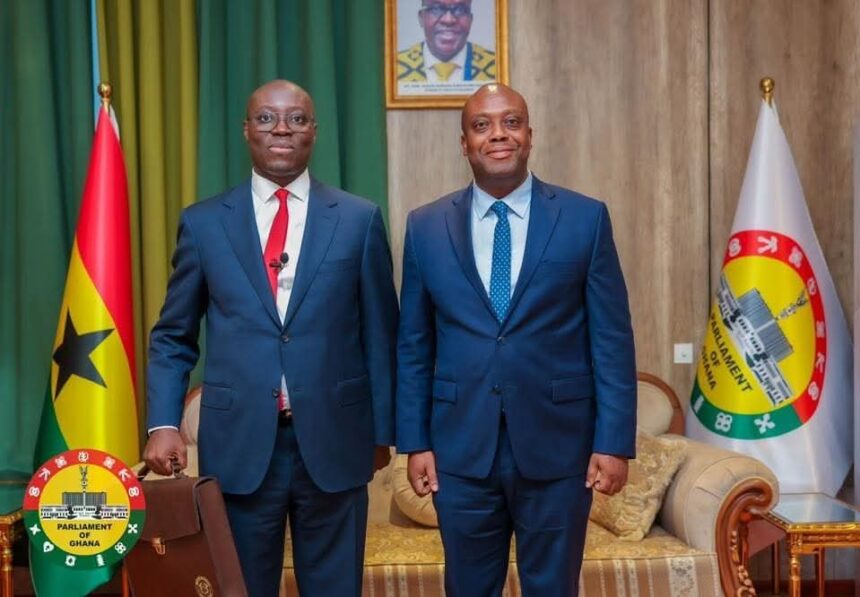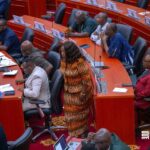The nation’s story, once shadowed by the tempest of debt and inflation, now faces the rising sun of stability. Behind this monumental shift stands a tandem of leadership at the Ministry of Finance, the men whose quiet resolve has turned the tide from constitutional crisis to compelling confidence.
The image captures not merely two individuals, but the very embodiment of Ghana’s economic Reset Agenda.
A free state is defined not just by its votes, but by its vitality. When the economy faltered, the fundamental contract between citizen and state was strained. The response, led by the astute Minister of Finance, Dr. Cassiel Ato Baah Forson, and his resolute Deputy, Hon. Thomas Nyarko Ampem, was a masterclass in moral and financial rectitude. Their tenure became a crucible where prudence was forged into policy.
The former government’s legacy was one of structural fragility; the current administration’s is one of unprecedented, rapid recovery.
While global headwinds persist, the core indicators, the nation’s financial pulse, have steadied dramatically: Inflation’s retreat, the most brutal tax on the poor, has been curtailed with aggressive fiscal discipline, restoring the purchasing power and the dignity of the Cedi.
Where the Cedi once mirrored a sinking ship, it now reflects the resilience of a sovereign currency; the stability achieved is a direct consequence of a deliberate strategy to bolster reserves, rationalize expenditure, and champion non-traditional exports.
Bloomberg’s temporary accolade of the Cedi as the best-performing currency globally was not luck, but the fruit of decisive action. Critically, the economy is not merely surviving, it is surging. Real GDP growth figures have soared, defying post-debt restructuring expectations. This is the ultimate proof that fiscal consolidation can, and must, coexist with aggressive, pro-growth policies like the President’s 24-Hour Economy initiative.
The tandem’s strength lies in their juxtaposition: a Chartered Accountant and Tax Practitioner as Minister, bringing decades of technical command, paired with a Deputy holding a Master of Science in Finance, ensuring strategic depth. They have collectively championed Constitutional Clarity in financial management, reinstating the Treasury Single Account and championing reforms to eradicate the opacity that fueled past crises.
The nation’s economic body can only thrive when its financial arteries are clean and its heart beats with transparency. Their reforms have been aphoristic in their simplicity and profound in their impact: cutting wasteful spending while protecting social investment, completing debt restructuring negotiations with speed, and, crucially, rallying the nation’s faith. This is the moral language of Leadership, to ask for sacrifice while demonstrating competency.
However, the defining feature of this Ministry’s mandate is the radical rethinking of Domestic Revenue Mobilization (DRM). Recognizing that the space to borrow is simply not there, Dr. Forson stressed that the nation must shift its focus from external debt to internal strength.
The Ministry has therefore embarked on an aggressive, sustained tax education programme, viewing taxation not as a burden but as a patriotic investment in the national future. Their strategy is a bold juxtaposition of relief and rigor: offering immediate relief to households and businesses by abolishing the 1% Electronic Transfer Levy (E-Levy) and the 10% withholding tax on lottery winnings, while simultaneously widening the tax net and reforming the Value Added Tax (VAT) regime.
Crucially, Minister Forson inaugurated a technical committee to establish the Ghana Gold Board (GoldBod), a specialized agency designed to formalize gold trading, boost foreign exchange reserves, and provide better control over exports, a game-changer that anchors the Cedi’s stability on Ghana’s own mineral wealth.
This combination of targeted tax abolition, robust compliance, and strategic sectoral reform is expected to yield new non-oil tax policy measures equivalent to at least 0.6 per cent of GDP, turning domestic resource mobilization into the engine of national solvency.
The work of these two men transcends mere statistics. The ‘Reset’ is not a temporary fix; it is the construction of a new foundation. The recently unveiled Ghana Infrastructure Plan (GIP), championed by Hon. Nyarko Ampem, outlines a multi-decade roadmap for connectivity and resilience, funded through innovative blended financing and a reformed Public-Private Partnership framework.
Dr. Forson’s leadership has ensured that the Ministry is now a force multiplier for the Big Push Initiative, allocating massive programmed financing to accelerate critical infrastructure expansion. The ultimate aim is not just to recover but to reposition Ghana as the regional hub for trade, logistics, and digital services.
Ghana is no longer at the mercy of the elements; it is the master of its financial fate. The vision is clear: stability today, prosperity tomorrow.
The legacy of this Ministry of Finance team will be the reclamation of hope, a testament to the fact that with clarity, courage, and competency, a nation can always reset its destiny.
By Raymond Ablorh







